As an Amazon Associate I earn from qualifying purchases.
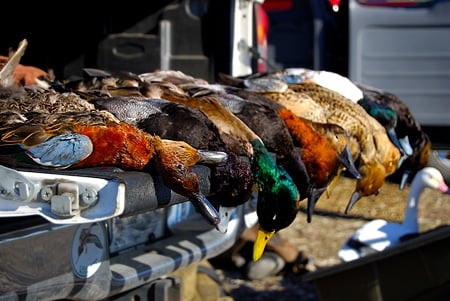
UPDATE: I want to thank everyone who has responded to this post, both below in the comments section and to me directly via email. More than one of your responses has been so moving it’s stopped me in my tracks. And Zane from Cleveland, your letter choked me up pretty bad. It is rare for me to write about such things; doing so feels like opening a vein in public. I am glad to know that I am not alone out there. Thank you.
I have been dealing a lot of death lately. I’ve hunted five of the past eight days, and have killed birds on each trip. My larder is filling, and Holly and I are eating well. Lots of duck, some pheasant and even a little of the venison I have left over from the 2010 season. That is the good side of all this, the side of hunting that most people can embrace. I hunt for a lot of reasons, but for me the endgame is always the table.
It is the journey to that table that can sometimes give people pause. What I do to put meat in my freezer is alien to most, anathema to some. In the past seven years, I can count on one hand the times I’ve had to buy meat for the home. This fact alone makes me an outlier, an anomaly. And that I am unashamed — proud, really — of this seems to cause a lot of folks I meet to look at me funny: I am a killer in their midst.
Not too long ago, I was at a book signing event for Hunt Gather Cook when a young woman approached me. She was very excited about foraging, and she had loved that section of my book. Then her face darkened. She told me she’d also read my section on hunting. “How can you enjoy killing so much? I just don’t understand it. You seem like such a nice person, too.” It took a few minutes for me to explain myself to her, and I am grateful that she listened. She left, I think, with a different opinion.
A few weeks later, I was at the University of Oregon talking about wild food to some students. When I mentioned hunting, I could feel the temperature in the room drop. It occurred to me that no one there was a hunter, nor were they close to any hunters. I called for a show of hands. One guy raised his. I asked him briefly about his hunting experience, and it was obvious that it had been traumatic for the poor kid. I let the topic slide and moved on to mushrooms.
When I was in Cambridge, Massachusetts, I spoke with more than 100 diners during my book dinner at the excellent restaurant Craigie on Main. Only four were hunters, although a few more wanted to start. Over the course of the night, I fielded weird question after weird question from diner after diner. Have I ever shot someone? Did I actually eat what I shot? Wasn’t I afraid of diseases? It was a stark show of ignorance. Not stupidity, mind you, just an utter lack of knowledge of what hunting is all about.
To be sure, these encounters were in college towns among a certain set of people. I had some book events, notably those in Montana, Pittsburgh and Austin, where most everyone who attended either hunted or was at least familiar with it. And in most places I could be assured of a healthy smattering of fellow hook-and-bullet types or farmers, who are equally familiar with the death of animals.
But the fact remains: Most people reading this have never killed anything larger than an insect, and among those who have it’s usually a been fish, or an accident — like running over someone’s dog. Most people have no idea what it’s like to take the life of another creature, let alone why someone would actively seek to do so. Let me try to explain to you the way I did to my young foraging friend on book tour. Let me tell you what it means to kill, at least for me.
To deal death is to experience your world exploding. It is an avalanche of emotion and thought and action.
Armed with a shotgun, it is often done without thought, on instinct alone. A flushing grouse gives you no more than a few seconds to pull the trigger before it disappears into the alders. A rabbit can leap back into the brambles in even less time. Unless you are perfect in that split second, the animal wins. And being human, we are far from perfect. Even with ducks, where you often have plenty of time to prepare for the shot, their speed and agility are more than adequate defenses. We hunters fail more than we succeed.
This is why we will often whoop it up when we finally bring a bird down: We are not being callous, rejoicing in the animal’s death. It is a hard-wired reaction to succeeding at something you have been working for days, months, even years to achieve. In some corner of your brain, it means you will eat today. This reaction can look repulsive from the outside.
Should you arm yourself with a rifle, you then must wrestle your conscious mind. Buck fever is real. A huge set of antlers will hypnotize the best of us, man and woman alike. Even if the animal lacks antlers, as mine often do, you have to contend with The Twin Voices: On one shoulder sits a voice shouting, Shoot! Shoot! You might not get another chance! On the other shoulder sits another voice, grave and calm: Be careful. You must not put that bullet in a place where the animal will suffer. Better to pass a shot than wound an animal. A wise hunter does not kill lightly.
In that moment when the game shows itself and you ready yourself to shoot, all that matters is that you do your job correctly. And that job is to kill cleanly and quickly. The animal deserves it; we would want no less were the tables turned. And make no mistake: A great many hunters, myself included, do this mental table-turning with some frequency. Seeing animals die so often makes us think of our own death, and I can assure you most of us would rather die with a well-placed shot than wither in a hospital.
We also know all too well that we are fallible creatures. When we fail to kill cleanly, when we wound the animals we seek, it is our duty to end their suffering ourselves. If there is a moment in this whole process that breaks my heart, it is this one. Everything wants to live, and will try anything it can to escape you. We see ourselves in this struggle, feel tremendous empathy for the struggling bird, the fleeing deer. It is a soul-searing moment where part of you marvels at the animal’s drive to live — to escape! — at the same time the rest of you is consumed with capturing it as fast as possible so you can end this miserable business. This internal conflict is, to me, what being human is all about. A coyote or a hawk has no remorse. We do.
I am not ashamed to tell you that I have shed a tear more than once when I’ve had to deliver the coup de grace to a duck. I’m not sure what it is about ducks, but they affect me more than other animals. I always apologize to it, knowing full well that this is a weak gesture designed mostly to help me feel better. But it does help me feel better. At least a little. So I keep doing it.
As the moment of killing fades, death rides home with you in the back of the truck. Once home, you must transmogrify the animal you killed into meat. The transformation is a mystical one, and every time I “dress” game — such a pleasant euphemism, that — I marvel at how fast my mind toggles from hunter to butcher to cook.
It is a necessary process, and one that is vital to why I have chosen this life, why I am a hunter.
I look down at my keyboard and see death under my fingernails. I smell the fat and gore and meat of dead ducks upon me; it’s been a good week of hunting. And because I eat everything on a duck but the quack, I have become intimate with the insides of waterfowl. Over the years, I’ve gutted and taken apart so many animals that I know the roadmap blindfolded. And that road leads to meals long remembered. I reach into a deer’s guts without thought: I want those kidneys, and that liver. I turn my arm upwards and wrap my fingers around its stopped heart, slick and firm. It will become heart cutlets, or jaeger schnitzel.
Once plucked and gutted, I can take apart a duck in 90 seconds. Maybe less. My fingers intuitively know which way and how hard to pluck each feather from a pheasant’s carcass. I know just where to put my boning knife, sharp as lightning, to slice the tendons that hold a hog’s tongue into its head. I use the same knife to caress its hind legs, separating the natural muscle groups apart along each seam. Some will become roasts, others salami. Animal becomes food. The pop of a goose’s thigh bone disjointing from its body no longer sickens me; all it means is that I need to slip my knife under that bone and around the coveted “oyster,” the best bite on any bird.
Wasting meat is the sin I cannot forgive. When I kill an animal, its death is on my hands, and those animals to whom I’ve had to deliver the coup de grace are especially close to me. There is a bond between us that requires that I do my part to ensure they did not die for nothing. This is why I spend so much time creating recipes for every part of the animal. Nature wastes nothing, and neither should I. It pains me to know that some hunters do not share this feeling, that they care only for backstraps or breasts — and while I know that coyotes and buzzards will eat what we do not, I do not hunt to feed those creatures.
You might ask me that with all this, why bother eating meat at all? Why deal with all the moral and emotional implications? In the face of such constant death, is it not better to be a vegetarian?
For me, no. It is a cold fact that no matter what your dietary choice, animals die so you can eat. Just because you choose not to eat the flesh of animals does not mean that their homes did not fall to the plow to become acres of vegetables and soybeans, wheat and corn. Habitat, more than anything, determines the health of a species. The passenger pigeon may have been snuffed out by wanton, unregulated hunting, but it was the massive destruction of virgin forest — forest cleared to grow crops — that brought the pigeon to the brink. I have nothing against vegetarians, and the vast majority I’ve met understand what I do and respect it. But to those few who do not, I say this: We all have blood on our hands, only I can see mine.
It all boils down to intimacy. Hunting has created an uncommon closeness between the animals I pursue, the meat I eat, and my own sense of self. There is a terrible seriousness to it all the underlies the thrill of the chase, the camaraderie of being with my fellow hunters and deep sense of calm I feel when alone in the wild. I welcome this weight: It fuels my desire to make something magical with the mortal remains of the game I manage to bring home. It is a feeling every hunter who’s ever stared into the freezer at that special strip of backstrap, or hard-won bird or beast understands.
Meat should be special. It has been for most of human existence. And no modern human understands this more than a hunter. I am at peace with killing my own meat because for me, every duck breast, every hog tongue, every deer heart is a story, not of conquest, but of communion.
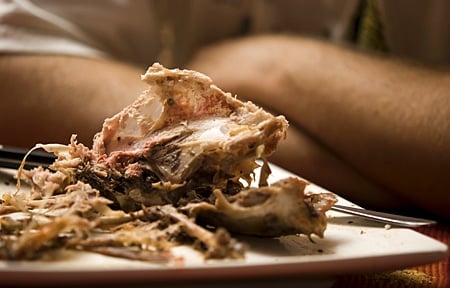
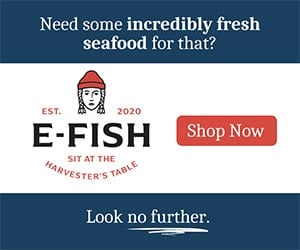
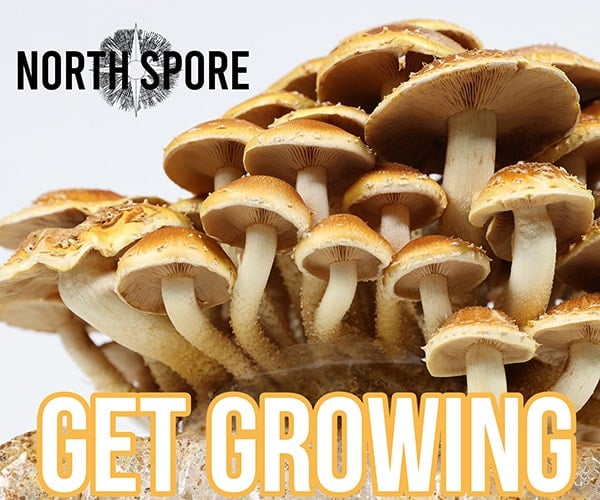
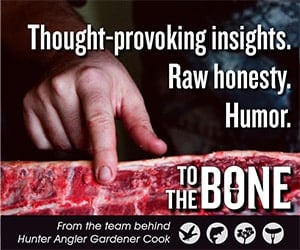
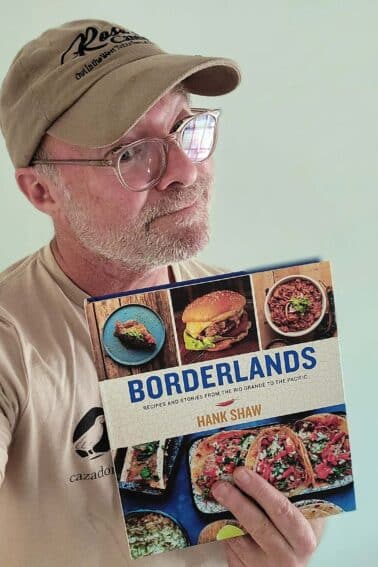
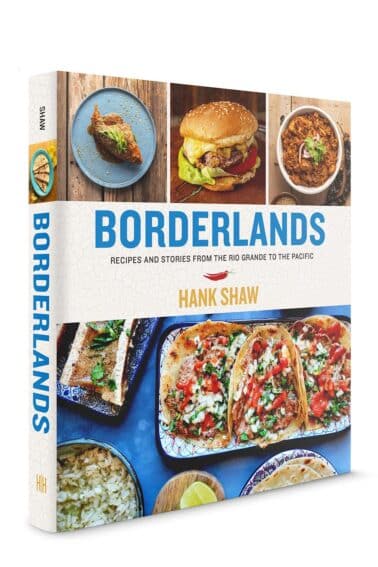
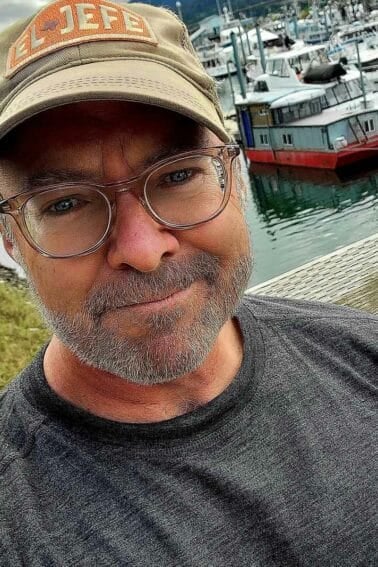
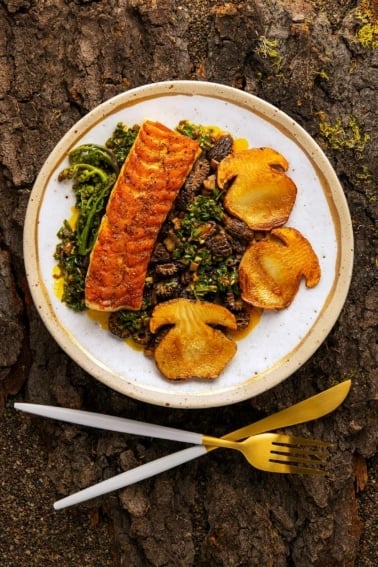
Ingrid, I’m so glad you weighed in here, partly because I feel a kinship with you; based on what you’ve written over at Holly’s blog, it would seem that we are two halves of the same spirit.
I do disagree with you here, of course, and I would like to clarify some points you took issue with:
Your first complaint would have merit, except that I did not say that because of the pain caused by vegetarians, the pain hunters cause is okay. I said that none of us can avoid causing death and pain when we nourish ourselves, and since “ought” must imply “can”, we are all stuck with a sad fact of the Earth. I then implied that, in light of this fact, hunting is ethically preferable, in that it doesn’t merely kill as an incidence of eating, and also that its very action creates more life than commodity-crop farming. (Here in California, hunting actually partially mitigates the ravages of monoculture, by making wild huge tracts that would otherwise sit as flattened sections of dry dirt for many months of the year).
Second, your attack on my argument about hunting subtracting from participating in food markets walks a little close to the tu quoque (“hunters do it, too”). As for its numerical quality, I was not referring to a study. I was looking at it as a person who has considered my actions in a deep way, and the harm and good that I do.
I know that, were I a vegan, I would have to rely more on commodity crops and heavy processing for my nourishment, while as a hunter, at least some of the food I get originates outside the market system. Since I grew up in the middle of monocrop country, I have no illusions as to the nature of Big Ag (and even small ag., and organic, sustainable, etc.) When you watch 200 seagulls and crows flocking behind a discer, you know that they aren’t picking up seeds; they are picking off dead bodies.
Yes, I still participate, to a large degree, in that system; right now, we cannot afford to completely remove ourselves from it. But I feel far, far worse for that than I do for buying my license and shooting a pheasant or a duck. I know which money has more blood on it, and which money has gone into preserving more habitat, more plants and animals. Hunters’ impacts to wildlife means more habitat protected than would otherwise be the case, and it means more animals and plants.
As for the communion comment, I have a more personal experience with that. There is a communion with the circle of life (yes, I know, Simba and all that) that takes place, and there is also a communion, of a type, in the predator-prey relationship that is unique. Who carved the graceful legs of the gazelle, but the lion? (To paraphrase a quotation I cannot seem to find right now.) But, I’m not trying to defend that in a way to convince you of my feelings on the matter; that communion is a personal experience, beyond the realm of reason, and it would cheapen both of our hearts to pretend that we could convince one another.
I, too, completely agree that many more people need to go to wildlife rehab facilities. They also need to go visit hospitals, for a parallel reason. My first wild animal rescue, I realized, as I reached down for that cormorant, that I didn’t know how to grab it, except by its neck to wring it. In that instant, I was changed; I had to cultivate a new physical relationship with this creature.
Simply great article Hank! Hunters are participants in nature, as we were created/evolved to be. When I’ve killed deer, I have felt sadness & even at times shed a tear. The anti-hunting, anti-human interaction with animals on any level people are so very out of touch with the earth.
Never been a hunter-too much work and guns are too loud for me. My earliest memories growing up were of gardening and caring for our animals. I was taught that the garden and animals were cared for with great respect to feed the family. We didn’t like having to kill our animals but once it was over with, cleaning, dressing and food preparation was done together with my parents and grandparents. We knew ‘who’ was on the table and the worst thing anyone could do was to waste the food. When people tell me that I am cruel because I eat the animals I raise, I can’t understand how they can be so cruel as to eat meat they have purchased and even toss away some of it uneaten. How can they ignore the fact that they are the reason that animal was killed, yet they themselves have not felt the pain of that sacrifice? They eat with no appreciation of the life given for them or the work someone else did in providing it to them.
Hank,
This has to be one of your best written and near-deeply personal posts I’ve read this year. It moved me.
Thanks for the mention in the update, Hank. You’re welcome. Happy hunting and cooking.
Thanks for your thoughtful reply, Hank! You wrote:
“All animals kill to live. It is the paradox of our existence.”
True, but there’s a big difference between killing plants which lack sensation — much less consciousness — and clearly sentient beings like pheasant, deer, turkey, and even fish. All these animals feel pleasure and pain much like we do. And they clearly want to live.
“What is unnecessary in your eyes is a vital part of life to me.”
Maybe I’m wrong, but I suspect you’d get by just fine without hunting. I mean, would you end your life if you couldn’t hunt? If not, then why do you think your interest in hunting — no matter how “necessary” — could come close to outweighing an animal’s interest in living?
I wasn’t going to weigh in because a lot of you here have heard my points of view way too many times in other blogs. But it’s tough to see the talking point about vegetarianism used over and over by hunters as an absolution of hunting, without any pragmatic refutation here.
First, it’s a fallacy of logic (“Tu quoque”) any time someone says “because this other thing causes harm, the harm I am causing acceptable.”
Second, you don’t cite where your figures come from in terms of vegans causing more incidental harm. If you’re using the Davis study, then you’re probably as aware of the refutation of the Davis study which cites serious flaws in the way the numbers were used in absolute terms versus per capita terms.
Third, you fail to take into consideration the huge proportion of those crops grown for the purpose of animal feed.
Fourth, many hunters, if not most, contribute to the very same system you criticize. How many hunters out there, for instance, never buy these same crops or grains at the store? There are some of course, like Hank, but I would argue that there are as many vegans, too, who source their foods carefully precisely because they are accustomed to understanding the consequences of their choices on the world food system and on animals as a whole. I’ve heard a lot of hunters comment about stopping off at a burger joint on the way back from a hunt, or resorting to fast food breaks on the road. So, in those cases, in addition to their impact by way of hunting wildlife, they contribute to the same agricultural and intensive farming systems you criticize. That impact is clearly more substantial than, say a vegetarian who doesn’t eat soy products or mass-produced grains.
Lastly, I have to agree with the commenter who took issue with the sense of communion and intimacy discussed here. That is clearly a one-sided perspective on a situation that resulted in the death and, sometimes, the prolonged suffering of one member in this so-called intimate relationship. You may feel that way, more connected and alive because of the blood on your hands, as you say. But from the outside, it sounds quite perverse to suggest an intimate relationship with the one you killed. It takes into account only the experience of the hunter, not the hunted, and it seems disingenuous to portray it in that way. I doubt you would see it that way in the case of human-to-human interaction that was this clearly imbalanced and violent. And yes, that’s a valid point because intimacy implies an equality of relationship.
Angela wrote, “I also have to say about taking game is that I love being able to get really close to an animal and see it and touch it, I would not be able to see what makes up a pheasant if I had I not hunted it.” I’ve seen people behave in myriad and strange ways toward wild animals, and I’ve often thought it’s because wild animals are inaccessible to most people and that people crave that connection, sometimes possession. I wish more people would translate that desire into helping, rather than harming. I know people in the wildlife rehabilitation field who would like it if they never again had to handle or see close up, an animal that’s come into the facility because of some form or human harm.
Spectrewriter, you make an interesting point about our (hunters’) self-interest in preserving habitat. Perhaps you are right about humans’ monkey brains – but then, we’d be the equal of other animals, and denying our animal rights to eat an omnivorous diet would contradict your position. However, I don’t really think you follow that line of reasoning (it’s a cheap shot, but one that does open up a logical inconsistency in your position). I believe you assume that we are a higher order than other animals, an order that can make conscious decisions about the harm we cause others. On this I agree with you. We are conscious, and thus higher ordered than most other animals vis a vis our global responsibilities (and the other animals with consciousness approaching our own eat a lot of meat, too, by the way). And yet, we cannot escape the law that “ought implies can.”
Humans are not disembodied phantasms; all of our actions have impacts. In the realm of eating, we are built to feed on life, and we have built systems that require the taking of space and life for our nourishment. A vegetarian diet requires inputs of commodity crops (soy and peanuts, in particular), and energy-intensive processing in order to maintain healthy body weights and energy levels. Both of these processes necessarily kill and maim many millions of animals. To whit:
Farmers must control pests; they must kill rats, mice, voles, gophers, and myriad insects. Most often, their farming techniques kill millions of birds, snakes, and other animals as unintended consequences. Please, visit the farms from which you buy your food, and ask about their pest management and their harvest methods.
Second, their control of their habitats necessarily picks winners and losers, and by “losers”, I mean wounded and dead animals.
Now to bring it to your point about self interest. You act on your self interest by letting some other person you don’t know kill a bunch of animals for your food, but you let the animals, themselves, rot and roll in pain in the field; you don’t even use their bodies, or thank them or think about them, because you are too deep into your own self-interest about not having any blood on your hands, directly (when it comes to food). Duck hunters act on their self-interest by paying farmers to create habitat that nurtures lives other than merely waterfowl. By paying for water to flood what was once wetlands, hunters’ self-interest builds nests for birds, for muskrats, for crawdads.
Additionally, by acquiring their food outside of the contrived food market system, hunters help alleviate hunger. When we perpetuate the notion of food as commodity, we perpetuate false scarcity (i.e., bad food markets), leading to socially constructed starvation for those who cannot afford food (we actually grow enough food to feed all of us right now; bad markets and borders starve people). When hunters go outside of the marketplace to get food, they impact the notion of food as commodity.
Your self interest only kills and takes (when dealing with food) as an afterthought, while hunters’ self-interest actually creates more wild animals, and alleviates contrived food scarcity, perhaps also as an afterthought. Which road may be better in our semantic circles is debatable; but the road that is better for the actual world, the wiser way (and so the philosophically preferable way), is obvious.
Beautiful post Hank! I grew up in a family that hunts, fishes, forages, grows & raises most of our food. But I haven’t been hunting since I was a teenager because I’m blessed with being able to enjoy the fruits of my Dad’s labor. One of these years I need to pick it up again. Your posts on using every part of the animal are great, that’s a lost art that I’m picking back up in our family and your recipes are very helpful.
Very good point Jen. Well said.
Its really only in the last 75 years or so that humans could have this viewpoint that hunting is barbaric and useless. The global supply chain gives us everything we need, whenever we want it. The fact that you can get Watermelon from Chile, Lamb from New Zealand, Cherries from Washington state and caviar from Russia in the middle of the city in February is INSANE and unsustainable. But I guess as long as “food” is readily available and cheap to buy, this attitude can and will continue.
On another note, how long before basic human actions like gardening or fixing our own leaky faucets or even wiping our own behinds are vilifed, or labeled by the hoi polloi as “beneath us”? Sure its an exaggeration to make a point, but where does this end?
Great writing Hank! Coming from a farmer, hunter & chef you nailed it!!!
Well said. Extremely well said.
Such a thought-provoking post. Thank you, Hank.
I’m among the 2.5% of Americans who choose a vegan diet. I try my best to align my consumption habits with my personal “do no harm” ethic. I find it simple, enjoyable and healthy and I encourage others to consider joining me.
Nearly all Americans oppose animal cruelty. Yet most routinely purchase and consume food from systems that keep animals confined in spaces so small they can barely move for their entire lives, that inflict painful procedures without the use of anesthetic or painkillers, that breed animals for such fast “meat” growth that their skeletons can’t withstand their weight. The suffering that billions of animals raised for food endure from birth to death is unconscionable.
With that scale of suffering in our midst, who can justify even a minute worrying about Hank’s killing? I haven’t done the math, but frankly it’s possible his way of eating causes animal suffering on a par with a vegetarian diet.
If you care about reducing animal suffering, I recommend spending your time telling others about the ills of factory farming, trying to reform those systems, and urging more people to think about where their food comes from and to act according to their principles. If wild animals are your focus, there are rampant poaching and abusive practices that demand our collective attention.
While my own walks in the woods will never involve shooting at or killing an animal, I’ll trade quarreling with Hank about his killing for the effort he makes to avoid – and encourages others to avoid – animal suffering.
“How is that difference — from the vibrant life they had to the dull, empty shell your imposing death upon them has caused — how is that anything better than wanton destruction? How is it any different, really, than the ravages of war?”
Comparing the killing of animals for food to the destruction that war causes is comical. I’m at least glad you didn’t compare hunting to war itself, such a comment would not have even deserved a reply.
The destruction that war causes is largely indiscriminate, it kills/destroys anything and everything that it has the misfortune to be nearby, including animals, soldiers, civilians, infrastucture, crops, water sources, not to mention a whole nation’s psyche.
The damage that hunting does is minute by comparison. One animal gets killed(hopefully with a clean shot), and the environment, people, other animals around it remain unscathed. I can also argue that most everything else is better off because of it. The hunter and his family get their food, the environment gets protected because of the money that goes into licensing and whatnot, and with some exception, the herd becomes thinned, which allows the remaining animals more access to food and habitat. Remember, we as humans have replaced/killed the natural predators that kept the natural world in check. I’m certainly not saying that we are “doing gods work” or that we deserve a medal, ‘Im simply saying that there is a place for it. There has been a place for it for the last 6000 years of man’s recorded existence.
To minimize it or villify something basic like hunting only shows how insecure of a species that we have become. The fact that we provide directly for ourselves in fewer and fewer ways only proves that we have lost touch with what it is to be human and to actually be part of(and not dominating) our natural world.
Hank,
Great post. I’m glad to hear that the emotions/outlook/conclusions you so eloquently describe are shared by so many. This should be required reading for the masses who have so long ago forgotten the process by which their steaks and hamburgers arrive at their tables.
And kudos to you for the illustrative counter-points to those who may disagree. It’s very easy to dismiss or denigrate those who speak out of ignorance. A reasoned, sensible and educated stand such as yours goes a long way in helping to enlighten minds and hearts.
Merry Christmas,
R.G. Piovesana,
Ridgeland Outfitters
I have no problem with hunting – but what about Ocean fishing? With factory fishing depleting the stocks of wild Ocean fish – especially predators – worldwide, is it really the right moral choice to contribute to the problem with Ocean game fishing? I’m not trying to be snide or snotty here – I’m genuinely curious how you reconcile this.
I actually think you need to flip the problem on its head. Just as on land, it is industrial, factory fishing (or farming) that is doing the most harm to the oceans, or is causing the most suffering to animals. To stick to industrial fishing for a moment, it is far better to catch and eat your own fish than support trawlers that mangle the seabed for cheap fish sticks. Recreational take of fish pales in comparison to commercial “harvest.” ~Hank
Hank, your response to #85 is nothing more than a justification, and a rather protracted one at that. Without man’s 7 Billion people, and our Clever Monkey intelligence, there would be no need for those watersheds. Nature has done just fine without us. It is we, and our indifference, which causes whatever need there may be. But for the most part, men put those ponds in place for their own pleasure, to attract game species, to keep the dust bowl from happening again, etc.
Hunters are not concerned with ducks in the plural, except as how not having them would make for a difficult hunt, It’s still self-serving, and nothing better or higher than that.
I return to the point that you never addressed: How is that difference — from the vibrant life they had to the dull, empty shell your imposing death upon them has caused — how is that anything better than wanton destruction? How is it any different, really, than the ravages of war?
Look at the creatures before. Then look at these after shots. How can anyone possibly confuse the act as anything but destruction?
There is a disconnect between how hunters and many biologists view animal welfare and how animal rights people tend to view it. Yes, these particular ducks are dead. I killed them. Nature is a hard mistress and never forget that we are part of nature. To do so is to deny who we really are. But on a larger level, you should know that I personally spend thousands of dollars every year on restoring, maintaining and expanding habitat for all waterfowl: ducks, geese and many species that are not hunted. Most hunters do this, even if it is just money from the licenses we buy. Hundreds of thousands of birds have a home because of us, and in return we can hunt — and yes, kill — a few hundred for a few weeks each year. It is a rare animal rights advocate who has spent such resources on habitat preservation. And remember, the marshes we maintain remain when we are gone.
Were we never there, there would be no marsh, no ducks. Hunters are primarily concerned with the welfare of ducks in the plural, while many animal rights people focus on the individual duck and ignore the larger issue of habitat. It is a deep divide that separates us. ~Hank
Agreed – one of your most important and best pieces, and telling too, with the momentum and spotlight it has generated in a short week. But the part that made my breath catch? Holly’s photo at the close surprised me and made me tearful, grateful. That sense of satisfaction, contentment, and thoroughness to the meal, captured 100%. Also, love the phrase about the deep calm you find in the field. I know that for sure for my husband and await the same for my sons.